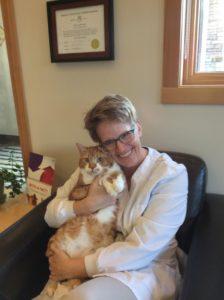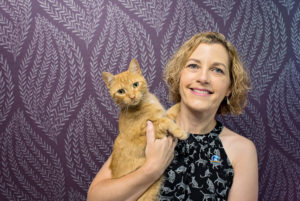Last year, I started a veterinary conference for butt-kicking, positive-vibe-creating, happiness-in-vet-practice-finding veterinary business nerds. So far, we’ve had two of these conferences and the third is coming up fast. Before each one of these events, I have gotten similar messages from people who are about to attend. Essentially, they say: “Don’t tell anyone, but I’m worried I’m not impressive or successful enough to be here. I’m afraid everyone at the conference will see that.” I hear similar statements from veterinarians who are staring down a surgery they haven’t done before, new managers who feel unprepared for the drama they are about to face, technicians who are about to try a procedure they have been trained for but haven’t mastered yet, and pretty much everyone else who feels comfortable confiding in me. I’d like to take a moment here to address this ridiculously common feeling.
Modesty aside, I have found great success in my chosen profession. I have won awards for writing and speaking, received consistently great feedback on my work, and been invited to present all over the world. People have made T-shirts with my face on them and worn them to events. At this point, my resume should be irrefutable proof that I am extremely qualified to do the things that I do for a living.
But you know what? Sometimes I lay awake in bed and worry about my next trip. When I get ready to speak, I imagine some genius from the vet school faculty will show up and point out how wrong I am. Or some specialist will ask who I am to talk to them about veterinary medicine. Or someone with an MBA or a massively successful hospital will question why I should talk to anyone about running a business.
I was nervous last week before I spoke at a veterinary school because I worried my experiences as a young vet would appear outdated, and now I’m worried that the muckety-mucks I’m on my way to meet in Portland will perceive me as some flaky internet vet with no real knowledge or value.
I don’t want you to get the impression that I live without confidence or suffer from anxiety. It’s not that. In the day-to-day, I’d say I’m quite confident in my abilities. It’s just that I, like everyone else, get imposter syndrome.
I don’t think anyone but raging narcissists truly believe they live up to their billings. We all know intimately what fires and flaws exist behind the scenes in our own lives. At the same time, we aren’t fully convinced that everyone else has an equally messy “backstage” because we have never and will never see it.
I think a bit of imposter syndrome is a good thing. I don’t ever want to be the person who believes his own hype, or becomes so confident that his views are unquestionably correct. I don’t want to stop checking and double-checking sources, updating statistics, practicing my skills, and preparing myself to be challenged. I never want to take the time that people give to me for granted. Fear of falling short is a handy tool for preventing that from happening.
On the other hand, imposter syndrome holds too many of us back. The idea that someone would be introspective enough to critically consider their own strengths and weaknesses, but then decide not to come to Uncharted (where that introspection would unlock true opportunities for growth), try new things in practice, or generally stretch themselves is heartbreaking.
So, what do we do when we feel like we aren’t good enough? There are a few things I’ve found that seem to help.
I think the most important step is to recognize imposter syndrome for what it is. If you name it, you rob it of most of its power. You realize that what you’re feeling is natural, and that your fear of being inadequate is not based in fact, but in common negative self-talk that we all experience.
If you’re still feeling uncertain, tell someone you trust. Clearly explain to a friend why you think you will fail. In my experience, two things will happen: (1) you will hear the words coming out of your own mouth and realize that they don’t sound rational, and (2) your friend will roll her eyes and dismiss or counter your concerns with an ease that is almost maddening.
Finally, teach someone. If you are struggling with confidence in an area, engage with people on that topic. Try to mentor someone. Do some training. I’m not saying you should name yourself an expert if/when you aren’t, but teaching with humility grows both the pupil and the instructor. Sometimes we don’t know how much we know until we unpack it all for someone else.
So, if you’re reading this and feeling like a fraud, please know two things. First, there’s a name for that feeling because it is so common, and second, the fact that you are self-aware enough to question your abilities is a good sign that you have the potential to grow and develop.
Imposter syndrome is a plague for successful people. Could you imagine having a job so mundane or so few opportunities that you NEVER questioned whether or not you can measure up? That, my friend, would be worse by far.
The views and opinions expressed in this article are those of the author and do not necessarily reflect the position of the DrAndyRoark.com editorial team.

